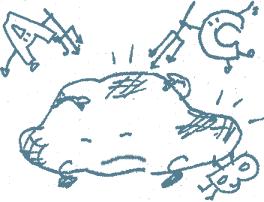How do I love my liver?
Protect your liver against three main threats.
Alcohol
- Give your liver at least two alcohol-free days a week.
- Drink no more than 2 standard drinks on any day.
- If you have cirrhosis, avoid alcohol altogether.
Fatty liver
Many of us are overweight and don�t do enough exercise. A build-up of fatty deposits in your liver can cause inflammation and scarring.
- Exercise at least half an hour a day regularly to keep a healthy weight.
- Eat plenty of fresh fruits and vegetables. 5 serves of vegetables and 2 serves of fruits.
- Drink lots of water.
- Avoid crash diets. If you need to lose weight, speak to your GP.
Viral hepatitis
- Get vaccinated against hepatitis A and B.
- Don�t share injecting equipment (including for steroids).
- Avoid tattooing, piercing and body art with unsterile equipment.
- Practise safe sex. Hepatitis C is not a sexually transmitted disease but it can be spread during sexual activity if blood is present together with lesions or cuts.
- Avoid medical or cosmetic procedures where equipment may not be fully sterilised.
- Speak to your doctor about testing for hepatitis B or C if you think you might have been at risk.
Not sure if you've been at risk?
Call 1800 437 222 for free and confidential advice.
[Hide Section]
What if my liver is sick?
Although your liver can repair itself, there is a limit to the abuse it can absorb.

Damaged liver cells form scars and nodules as they try to regenerate. This is called fibrosis. Fibrosis can eventually lead to cirrhosis - permanent damage that interferes with the function of the liver.
You have only one liver. A damaged liver cannot perform its usual functions in maintaining the normal processes in your body. It won�t be as able to fight infections, remove waste and toxins and regulate the levels of glucose and other essential chemicals in your body. Your health will suffer.
Check out the list of things your liver does for you. That�s what you�ll be missing out on when your liver is sick.
According to the Australian Liver Foundation, over two million Australians are, or have been, affected by liver, bile duct or gall bladder disease. Over 2,000 die each year from chronic liver diseases, cirrhosis and cancers of the liver, gall bladder and bile ducts.
Worried your liver might be sick?
Speak to your doctor or call 1300 437 222
[Hide Section]
What makes my liver sick?
There are hundreds of liver disorders and some are quite rare.
Many liver disorders are preventable and if detected early, can be treated effectively.
Some common liver diseases include:

Alcoholic Liver Disease
Not everyone who drinks heavily will develop alcoholic liver disease, but for many people, consistent heavy drinking can lead to fatty liver where your liver cells become swollen with excess fat. This can result in liver inflammation - also known as alcoholic hepatitis - which can result in a permanently scarred and damaged liver.
The more alcohol you drink and the more frequently you drink, the more likely you are to develop cirrhosis.
For more information about alcohol and the liver call 1300 437 222.

Viral hepatitis
This is inflammation of the liver caused by virus. The most common in Australia are hepatitis A, B and C.
Hepatitis A is spread by consuming food or drinks which are contaminated by the hepatitis A virus. This is more common in communities where hygiene standards and sanitation are poor. There is a vaccine for hepatitis A.
Most people recover within weeks although they may feel tired for many more months.
Hepatitis B is spread via blood to bloodstream contact, sexual contact and from mother to baby. Over 170,000 people in Australia are living with chronic hepatitis B.
Left undiagnosed and untreated, hepatitis B can lead to serious liver disease and liver cancer.
Worldwide, the most common way by which hepatitis B is spread is from mother to baby. There is a vaccination for hepatitis B.
Hepatitis C is spread by blood to bloodstream contact and is not classified as a sexually transmitted infection. Over 212,000 people in Australia are living with chronic hepatitis C. There are 10,000 new infections each year.
There is no vaccine for hepatitis C but treatment is available with up to 80 per cent of treated people clearing the virus.
For more information on hepatitis A, B or C call 1300 437 222.
[Hide Section]
More information!





